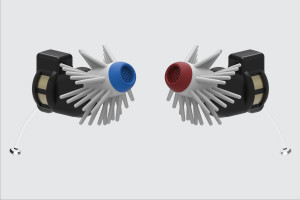 Hearing aids often meet with resistance from the very people who could use them most—either because they’re not comfortable, they’re too obvious, or they’re too expensive. Startup Eargo` aims to transform the market by solving all three of these common issues.
Hearing aids often meet with resistance from the very people who could use them most—either because they’re not comfortable, they’re too obvious, or they’re too expensive. Startup Eargo` aims to transform the market by solving all three of these common issues.
At first glance, you wouldn’t even think Eargo is a hearing aid. The design, says co-founder Raphael Michel, originated with his father, an ENT surgeon who had heard complaints from his patients for years.
Eargo, which has Series A funding from Maveron and Dolby Family Ventures, is designed to fit in the ear canal, without uncomfortably plugging it. Medical grade silicon brushes are arranged around the speaker in a way that both maximizes comfort and enhances the hearing experience. The bristles allow ambient noise to still reach the ear, and they help mitigate feedback noise, a common problem with current in-ear hearing aid designs. Electronics and a rechargeable battery are also housed inside a medical-grade enclosure. A narrow plastic strip at the back provides a way to easily remove the device.
Eargo uses inductive charging to keep its hearing devices charged and at the ready. The included, stylishly slim case has a built-in rechargeable battery to keep Eargo charged while on the go. An included dock uses the Qi wireless charging standard so you can simply drop the case onto it for charging. Or, you can drop the Eargo devices themselves onto the dock, and they’ll recharge directly. Eargo’s built-in battery is designed to last 16 hours.
Notably, Eargo is certified as a Class 1 medical device. And Michel says the company is working with individual state boards to approve direct sales of Eargo. Currently, Eargo is available for sale in 25 states, including California, but not including New York.
Eargo costs $1,980, half the average cost of regular hearing aids. It has minimal on-board programming adjustments—just four levels of volume, controlled by covering your ear once per level adjustment. If you have more loss in one ear versus the other, or have an audiogram, Eargo can have its own audiologists custom-program your Eargo for an extra $500.